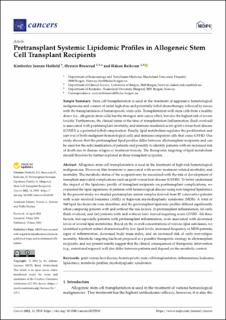| dc.description.abstract | Allogeneic stem cell transplantation is used in the treatment of high-risk hematological malignancies. However, this treatment is associated with severe treatment-related morbidity and mortality. The metabolic status of the recipient may be associated with the risk of development of transplant-associated complications such as graft-versus-host disease (GVHD). To better understand the impact of the lipidomic profile of transplant recipients on posttransplant complications, we evaluated the lipid signatures of patients with hematological disease using non-targeted lipidomics. In the present study, we studied pretransplant serum samples derived from 92 consecutive patients with acute myeloid leukemia (AML) or high-risk myelodysplastic syndrome (MDS). A total of 960 lipid biochemicals were identified, and the pretransplant lipidomic profiles differed significantly when comparing patients with and without the risk factors: (i) pretransplant inflammation, (ii) early fluid overload, and (iii) patients with and without later steroid-requiring acute GVHD. All three factors, but especially patients with pretransplant inflammation, were associated with decreased levels of several lipid metabolites. Based on the overall concentrations of various lipid subclasses, we identified a patient subset characterized by low lipid levels, increased frequency of MDS patients, signs of inflammation, decreased body mass index, and an increased risk of early non-relapse mortality. Metabolic targeting has been proposed as a possible therapeutic strategy in allotransplant recipients, and our present results suggest that the clinical consequences of therapeutic intervention (e.g., nutritional support) will also differ between patients and depend on the metabolic context. | en_US |

